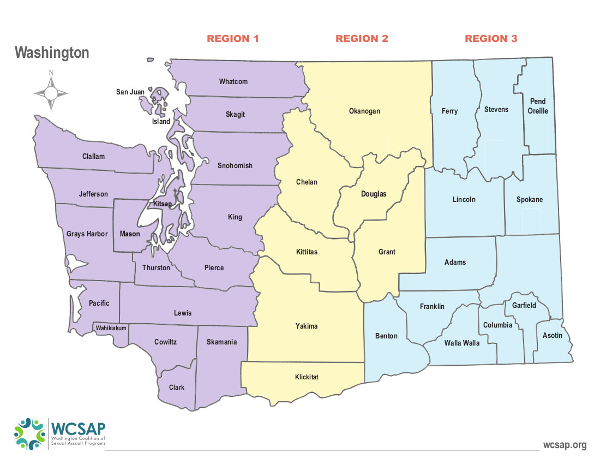Washington State is a national leader in the field of sexual violence services. The service system was developed in Washington with a profound commitment to victims' needs and continues to be supported by a statewide infrastructure that includes state government and nonprofit organizations. Washington is fortunate to have funding from state government and a dedication to services specifically for sexual assault victims.
Why do we have accreditation?
In 1994, sexual assault service providers across Washington State came together to examine ways to improve Washington's service delivery system and infrastructure (for more about this process, please see the 1995 Final Report from the Washington State Sexual Assault Services Advisory Committee). These service providers examined the needs of the whole state and determined that it would best serve all survivors of sexual violence to create a range of services that would be consistently available in every corner of the state, rather than rely on the variability inherent in the original competitive funding process. To ensure that every program providing these services would be qualified to do so and to ensure that every program would have the management capacity to operate with government funding, the group proposed and later crafted an ongoing accreditation process.
The accreditation process and standards emerged from the field of sexual assault service providers in Washington State. Accreditation is a system that helps to ensure that every program has the mechanisms in place to run the state sexual assault funding contracts effectively. The statewide accreditation process supports a noncompetitive funding distribution structure that drives money into every area in Washington State, with the objective of providing access to needed services for survivors throughout the state.
The Accreditation Standards strive to guarantee that everyone providing services to survivors is trained and qualified to do so, that survivors receive services consistent with the service definitions, and that every program receiving sexual assault funding has the management structure and policies needed to provide accountability for those funds. The Standards themselves cover a broad array of subject matter, ranging from agency governance to quality assurance. The Standards include nonprofit regulations as well as issues surrounding client safety and confidentiality. While the Standards are comprehensive, they are not overly prescriptive. In fact, many standards require that each agency have a policy to address a specific subject, but do not outline what that policy should be. There is flexibility in many of the standards to meet the requirements in a way that reflects the needs and individuality of each program.
As a New Community Sexual Assault Program Director....
If you are the director of a program that receives OCVA funding and is subject to accreditation review, getting familiar with the accreditation standards from the get-go will serve you well! The accreditation process can be daunting, but with a bit of organization and ongoing attention to the necessary documentation, you will be in great shape.
Key Questions to Ask:
- When is our next accreditation review?
- How did our program fare in its last accreditation process (can you find your old score sheet - if not, ask OCVA)?
- What evidence from your past review do you still have on hand? Do you have a set of files, folders, notebooks, or electronic files for accreditation?
- Is anyone on staff experienced with any part of the accreditation process?
